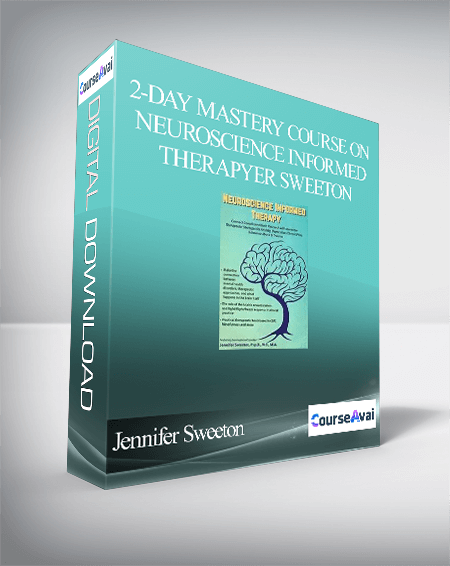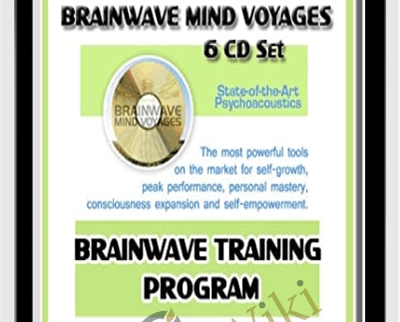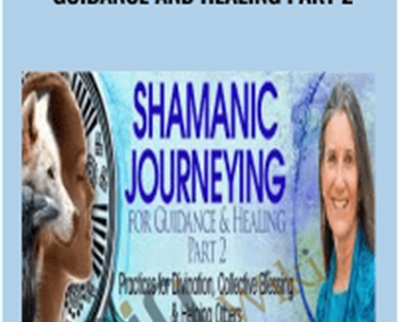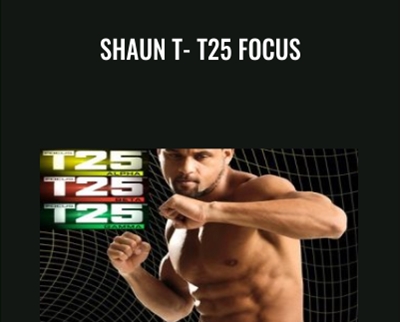2-Day Mastery Course on Neuroscience Informed Therapy: Connect Complicated Brain Research with Accessible Therapeutic Strategies for Anxiety. Depression. Chronic Pain. Substance Abuse & Trauma – Jennifer Sweeton
$80.00
Salepage link: At HERE. Archive:
DOWNLOAD INSTANTLY
PLEASE CHECK ALL CONTENTS OF THE COURSE BELOW!

 2-Day Mastery Course on Neuroscience Informed Therapy: Connect Complicated Brain Research with Accessible Therapeutic Strategies for Anxiety. Depression. Chronic Pain. Substance Abuse & Trauma – Jennifer Sweeton
2-Day Mastery Course on Neuroscience Informed Therapy: Connect Complicated Brain Research with Accessible Therapeutic Strategies for Anxiety. Depression. Chronic Pain. Substance Abuse & Trauma – Jennifer Sweeton
The latest findings from neuroscience have given us incredible insights into the workings of the brain and its connection to our psychological and physical well-being. Yet in-depth studies on the brain can be difficult for mental health clinicians to interpret -names like “Subgenual anterior cingulate cortex” mean very little to most of us.
And you face a bigger obstacle than terminology. How do you overcome the challenge of applying complicated scientific and biological information to your clinical practice? How does neuroscience help you when you’re face-to-face with clients working on stress, depression, addiction and the other problems they face each day?
This recording will connect critical concepts from science and biology to your clinical work with anxiety, depression, chronic pain, substance abuse and trauma.
Better still, you’ll go beyond the biological mechanisms that underlie various disorders with detailed instruction on actual treatment strategies you can use with your clients. Through case studies, experiential exercises, and brief lectures you’ll learn to individualize interventions based in Mindfulness Based Cognitive Therapy, Attachment, and Somatic Psychologies and apply them to the treatment of mood disorders, trauma, addictions, and more.
Better still, you’ll have the opportunity to practice the application of what you’ve learned under the skilled supervision of our instructor, and take home detailed handouts allowing their immediate incorporation into your clinical work.
Cut through the baffling research and inaccessible jargon, and discover how understanding neuroscience can change the way you view and work with your clients!
- Analyze the role of the nervous system in mental health disorders and communicate how this knowledge impacts the clinician’s choice of therapeutic intervention.
- Employ psychoeducational approaches that make the neurobiology of mental health conditions understandable for clients.
- Establish how an understanding of neuroscience and neuroanatomy can be used by mental health professionals to cultivate motivation and promote engagement in therapy.
- Evaluate research on mindfulness and articulate how mindfulness can be used as an adjunctive approach in your treatment plans for depression.
- Communicate how memory malleability impacts your treatment of clients with traumatic memories.
- Discover how the neurobiology of addiction can help you establish realistic goals with clients with substance use disorders.
- Establish the role of the neurobiological fight, flight, or freeze response in trauma symptomology.
- Characterize how attachment impacts key brain networks and informs the clinical treatment of affect regulation and mood disorders.
- Communicate how research findings regarding the relationship between diet and mental health could impact treatment approaches for various disorders.
- Evaluate how an understanding of the neurodynamics of habit formation informs the therapist’s clinical approach to foster behavioral change.
- Appraise the latest scientific research on gratitude and explore the benefits and limitations of using approaches based in positive psychology.
- Articulate how mindfulness practices can be used in therapy to impact the stress reaction and shift clients to a relaxation response.
Get 2-Day Mastery Course on Neuroscience Informed Therapy: Connect Complicated Brain Research with Accessible Therapeutic Strategies for Anxiety, Depression, Chronic Pain, Substance Abuse & Trauma of author Jennifer Sweeton only price 119$
DAY 1
Understand the Brain’s Reward System
- Habit formation & maintenance
- Why the brain doesn’t always choose well
- The conscious brain myth
- Brain dictated actions
- Impulse vs routines
- Reward & habit
- Coping & stress
- Brain-wise change
- Impulse strategies
- Serotonin
- Solidifying change – from neurons to brain regions
- From state to trait: Brief experiences to long lasting change
- Willpower
- Willpower: where does it reside?
- Role of exercise
- Mindfulness
- A brief willpower workout
The Body’s Impact on the Brain: Alter Physical State to Manage Stress and Anxiety
- Body-Brain-Mind Talk
- The Vagal Nerve
- Heart rate variability
- Interoception
- Build stress resiliency & emotional regulation
- Breath, posture, deep relaxation
- The Body-Brain-Mind connection across treatment approaches
The Brain’s Impact on the Body
- Chronic pain, nociceptors and neurotransmitters
- Dorsolateral prefrontal lobe and the centralization of pain
- The influence of stress on pain and inflammation
- Pain measurement
- CBT interventions to reappraise pain
- Pain catastrophizing
- Biofeedback
- Mind-Body interventions for pain
How Relationships Change the Brain: The Neuroscience of Attachment
- Neuropeptides: behavior and oxytocin
- Healing through the social brain
- The role of storytelling
- The brain in love
- Brain behavior of long-term love
- Novelty vs. habit
- Engendering secure attachment
- Key brain networks
- Build compassion & empathy
DAY 2
From a Depressed Brain to a Resilient Brain
- How the depressed brain gets stuck
- Hemispheric laterality
- Cytokines & depression
- The neuroscience of guilt & shame
- Opposing pathways
- Brain intercommunication
- Gratitude – neurochemistry & practice
- Neurofeedback: Research on direct communication with the brain
Trauma Treatment and the Science of Memory
- Grounding
- Titrating emotions with mindfulness
- The fight/flight/freeze response in trauma
- Executive functioning
- Implicit memories
- Dual awareness
- Brain savvy narratives
- Breath/Movement/Awareness
- The treatment of shame in trauma
The Addicted Brain: Clinical Implications of the Neuroscience of Craving
- The role of the reward center
- The neuroscience of craving
- Mindfulness & movement based supports
- Identifying false sanctuaries & underlying beliefs
- Dual awareness
- Overcome conflict and risk avoidance
- The Aging Brain
- Brain changes across the lifespan
- Memory improvement strategies
- Buffering from Alzheimer’s Disease
- Is Mindfulness a neuroprotective approach?
Nutrition & the Brain: We Are What We Eat!
- Nutrition for optimal brain functioning
- The brain on sugar
- Nutraceuticals
- Creating an interdisciplinary team
The Limitations of Neuroscientific Research and Potential Treatment Risks
- fMRI imaging – blood flow vs. neuronal activity
- How only looking at brain activations produces an incomplete picture
- Neuroscientific studies, sample size, and validity
- Animal research – directly applicable to humans?
- Psychotherapeutic techniques – specific limitations and risks
Here's an overview of the prominent keywords and a list of famous authors:
Business and Sales: Explore business strategies, sales skills, entrepreneurship, and brand-building from authors like Joe Wicks, Jillian Michaels, and Tony Horton.
Sports and Fitness: Enhance athleticism, improve health and fitness with guidance from experts like Shaun T, Kayla Itsines, and Yoga with Adriene.
Personal Development: Develop communication skills, time management, creative thinking, and enhance self-awareness from authors like Gretchen Rubin, Simon Sinek, and Marie Kondo.
Technology and Coding: Learn about artificial intelligence, data analytics, programming, and blockchain technology from thought leaders like Neil deGrasse Tyson, Amy Cuddy, and Malcolm Gladwell.
Lifestyle and Wellness: Discover courses on holistic health, yoga, and healthy living from authors like Elizabeth Gilbert, Bill Nye, and Tracy Anderson.
Art and Creativity: Explore the world of art, creativity, and painting with guidance from renowned artists like Bob Ross and others.
All the courses on WSOlib are led by top authors and experts in their respective fields. Rest assured that the knowledge and skills you acquire are reliable and highly applicable.
Specification: 2-Day Mastery Course on Neuroscience Informed Therapy: Connect Complicated Brain Research with Accessible Therapeutic Strategies for Anxiety. Depression. Chronic Pain. Substance Abuse & Trauma – Jennifer Sweeton
|
User Reviews
Only logged in customers who have purchased this product may leave a review.

$80.00












There are no reviews yet.